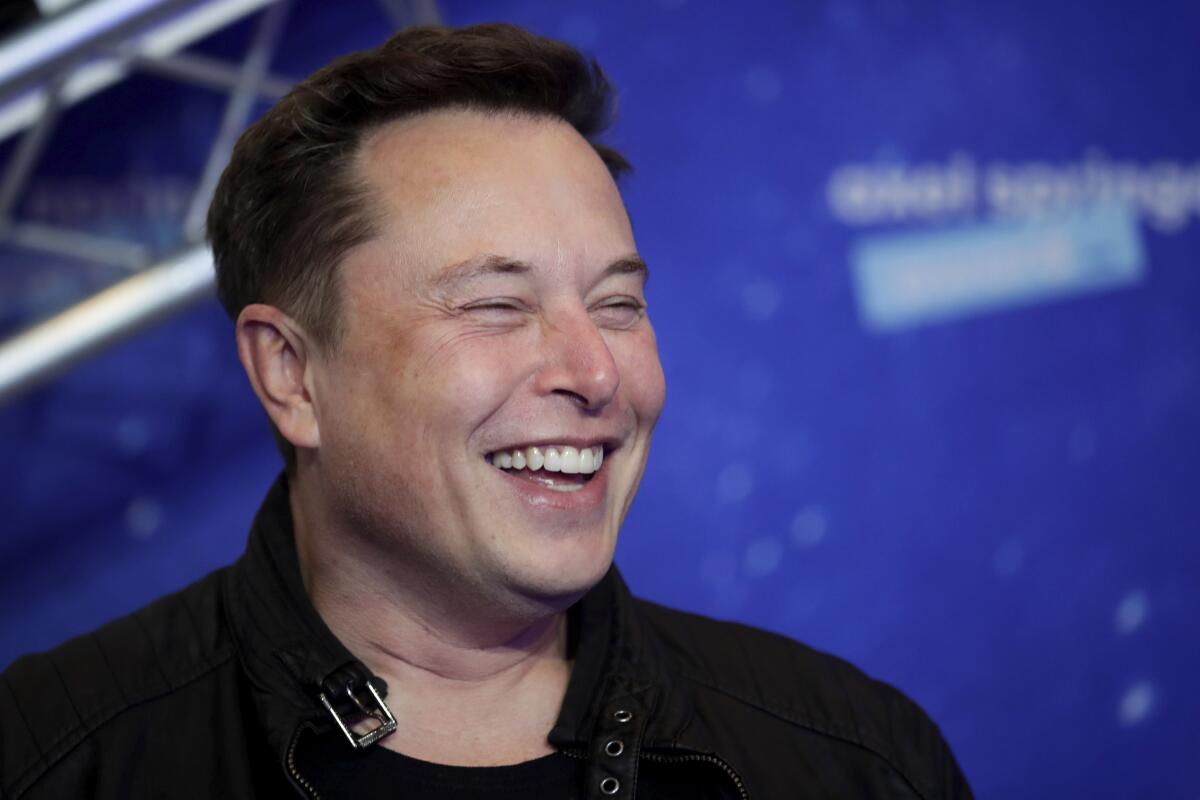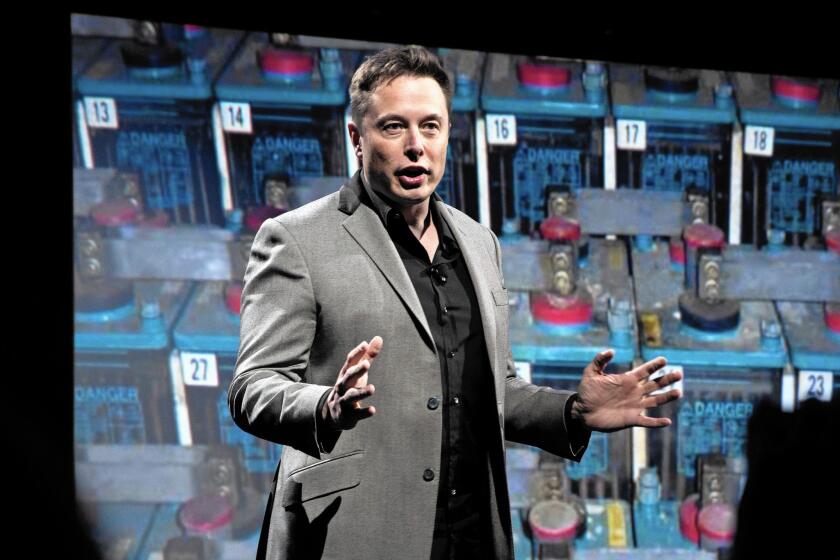Tesla’s dabbling in bitcoin is a perfect distraction from its real-world problems

- Share via
Whoever rewrote the saw about where there’s smoke there’s fire into “where there’s smoke, there’s often a smoke-making machine” (John F. Kennedy often gets the credit), there’s little question that one of the prime smoke-making machines in American life right now is Elon Musk.
Consider Musk’s latest vaporous cloud — the announcement on Feb. 8 that his Tesla electric car company had made a $1.5-billion investment in the cryptocurrency bitcoin starting in January.
That’s more than Tesla has spent on research and development in any of the last three years.
Tesla has shown respect for the potential of the Chinese market, but not the same level of respect is given to Chinese consumers.
— Global Times
The announcement helped send the price of bitcoin up by as much as 25% in a day, though it seemed to have the opposite effect on Tesla shares, which have lost about 4% since then. Bitcoin reached a record $47,698 on Feb. 8 before falling back to about $45,000 by midweek, according to Coinbase.
The whole episode adds just more muddle to the enduring question of whether Tesla is grossly overvalued, especially since it has yet to turn a net profit from selling cars.
The company’s market capitalization of $780 billion far outstrips the combined valuation of General Motors and Ford (about $125 billion), even though Tesla sold 500,000 vehicles last year and the other two companies more than 10 million, combined.
Tesla’s bitcoin announcement happened to coincide with a couple of doses of bad news for the company.
One was a Feb. 6 report in the Global Times, an English-language publication of the Chinese Communist Party, that the Chinese government had upbraided Tesla for lapses in quality control and consumer relations in China. That’s a concern because Tesla has enjoyed a very favorable relationship with the Chinese government, so far.
California’s ban on gas-fueled vehicles calls the auto industry’s bluff on zero emissions
“Tesla has shown respect for the potential of the Chinese market, but not the same level of respect is given to Chinese consumers,” the publication reported, citing “analysts.”
The second was a report from German sources that the company’s German car and battery factories were facing months of construction delays, as well as reduced government subsidies for the battery plant.
Musk, who has been accustomed to investors’ buying into his enthusiasms and raising Tesla’s stock price, may have appreciated the extent to which commentary about Tesla focused on its bitcoin adventure rather than its ground-level issues with Chinese regulators and European construction.
When things are going well, Musk promotes the good news relentlessly. When they’re going not so well, there are plenty of sideshows in the offing to distract followers from Tesla’s bottom line.
In recent years, these sideshows have included Musk’s public toying with taking Tesla private, an adventure that yielded a punitive response from the Securities and Exchange Commission; Musk’s war with short sellers; his marketing of flamethrowers; and his public spat with a rescue expert who had dismissed Musk’s effort to help save a group of Thai students trapped in a cave.
Has Elon Musk worn out his welcome in California at last?
The most consistent misdirection Tesla engages in applies to its disclosures of profits. On the surface, these have been a bright spot.
In reality, in almost every quarter and throughout 2020, Tesla’s profits have been dependent on the sales of regulatory credits to other companies — without them, Tesla would have been in the red. Last year, for example, Tesla reported $721 million in net income and sales of regulatory credits, which are pure profit, of $1.6 billion.
The most bewildering aspect of Tesla’s bitcoin investment is the threat it poses to Tesla’s profit-and-loss statement. In disclosing the investment, Tesla said its bitcoin would be carried on its books as “indefinite-lived intangible assets.”
According to accounting rules, those assets must be evaluated every quarter; Tesla will have to report a loss any time the value of its bitcoin falls below its purchase price. But Tesla isn’t permitted to recognize a gain, even if the price rises, unless and until it sells its bitcoin.
Obviously, this unbalances the bitcoin accounting toward a loss. If bitcoin rises, Tesla could sell its bitcoin at any time and recognize the gain.
But given how much bitcoin rose on the news that Musk had bought in, can you imagine how much it might fall on the news that “Elon Musk is selling his bitcoin”? To put it another way, Tesla’s investment may be almost as much of a risk for bitcoin holders as it is for Tesla; bitcoin fans better pray that Musk doesn’t cool on the crypto.
The other aspect of Tesla’s announcement that helped fuel bitcoin’s rise was the suggestion that Tesla might start accepting bitcoin as payment for its cars “in the near future,” albeit “initially on a limited basis.”
That spurred a surge of speculation about whether Tesla’s decision might set the stage for wider commercial acceptance of bitcoin as payment for goods and services. The general conclusion among experts is that it won’t, for several reasons.
Among the terms that have been added to the lexicon of our post-truth world is “gaslighting,” defined as a form of psychological abuse designed to make someone doubt their own sanity.
For one thing, transaction fees for converting currencies into and out of bitcoin can be steep, making the cryptocurrency uneconomical for small purchases.
Moreover, bitcoin is so hellishly volatile that merchants can’t be sure from one moment to the next what it’s worth, and therefore how much they’ve sold their products for — bitcoin can fall or rise by 20% in a matter of hours.
Tesla acknowledged that reality by disclosing that the bitcoin it received for its cars “we may or may not liquidate upon receipt.” That also suggests that the company doesn’t necessarily plan to build up its hoard of bitcoin by holding on to whatever it receives from customers.
Tesla’s investment, however, does come as digital currencies are gaining limited acceptance among financial institutions. On Thursday, Bank of New York Mellon said it would offer custodial services for the assets to its big institutional clients, servicing their holdings as it does their bond and stock portfolios. Some public pension funds have also bought cryptocurrency investments, treating them as speculative assets much as they do venture capital funds.
By bringing cryptocurrencies into traditional financial structures, these steps may run counter to bitcoin fanciers’ ideology, which sees them as alternatives to centrally controlled financial systems.
Still, Musk’s apparent fascination with bitcoin is perplexing. As my colleague Russ Mitchell pointed out following the company’s investment disclosure, bitcoin is an odd investment for a company that presents itself as an ecological hero because the cryptocurrency is the antithesis of a “green” commodity.
“Mining” bitcoin — the strictly controlled process by which the supply of bitcoin is augmented — requires electricity on an enormous scale to run the computers involved. As Mitchell reported, cryptocurrency mining produced emissions of carbon dioxide equivalent to that produced by more than 4 million gas-powered cars a year.
In other words, what Elon Musk is giving the world by producing electric vehicles, he’s helping to take away by participating in the bitcoin ecosystem.
The remaining mystery is what Musk really thinks about bitcoin and other cryptocurrencies. He has often portrayed himself as an enthusiast of the concept, which tracks with his persona as an entrepreneurial iconoclast.
But he has also been dismissive, as he was as recently as Dec. 20, when he tweeted, “Bitcoin is almost as bs as fiat money.” His reference was to central-bank-linked currencies, which bitcoin fans typically denigrate as fiat money because their supply can be expanded or shrunk as governments wish.
Barely a month later, Tesla was jumping into the pool.
More to Read
Inside the business of entertainment
The Wide Shot brings you news, analysis and insights on everything from streaming wars to production — and what it all means for the future.
You may occasionally receive promotional content from the Los Angeles Times.













